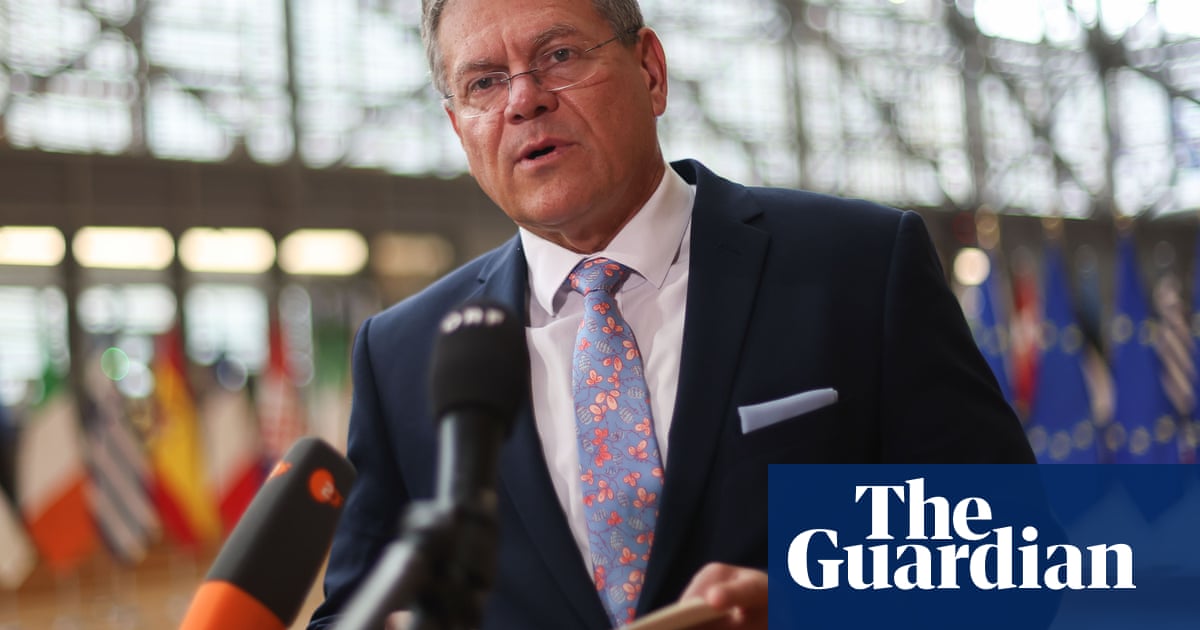The European Union’s trade chief has struck a defiant tone after Donald Trump threatened to place a 50% tariff on all goods from the bloc, saying any potential trade deal between Brussels and Washington must be based on “respect not threats”.
The US president made his announcement aftervoicing frustration with the pace of progress on a trade agreementwith the EU. The new rates would come into effect from 1 June.
The EU trade commissioner, Maroš Šefčovič, posted on X after a call with the US trade representative Jamieson Greer and the commerce secretary, Howard Lutnick: “The EU’s fully engaged, committed to securing a deal that works for both.
“The European Commission remains ready to work in good faith. EU-US trade is unmatched and must be guided by mutual respect, not threats. We stand ready to defend our interests.”
Trump had posted on Truth Social, the social media website he owns: “The European Union, which was formed for the primary purpose of taking advantage of the United States on trade, has been very difficult to deal with.”
He went on to claim there was a $250m annual trade deficit with the EU. “Our discussions with [the EU] are going nowhere,” he said, before adding there would be no tariffs for products built or manufactured in the US.
Trump later told reporters: “I’m not looking for a deal – we’ve set the deal,” before immediately adding that a big investment in the US by a European company might make him open to a delay.
The EU is one of the US’s largest trading partners, sending more than $600bn (€528bn; £443bn) in goods last year and buying $370bn worth, US government figures show.
The US imposed a 20% “reciprocal” rate on most EU goods from 2 April, but halved them a week later to allow for trade talks. It has kept 25% import taxes on steel, aluminium and vehicle parts in place and has threatened similar moves on pharmaceuticals, semiconductors and other goods.
In the same press conference, Trump said hemight add a 25% levy on all Apple and Samsungphonesbought by US customers. That would be in place at the end of June, he said. His commentstriggered falls in leading US stock indexesand European shares, Associated Press reported.
Sign up toThis is Europe
The most pressing stories and debates for Europeans – from identity to economics to the environment
after newsletter promotion
European politicians said they were disappointed by the news of further tariffs from the US. The French trade minister, Laurent Saint-Martin, said Trump’s new threats did nothing to help negotiations.
“We are maintaining the same line: de-escalation, but we are ready to respond,” he wrote on X.
The Italian foreign minister, Antonio Tajani, told the Ansa news agency that the aim remained “zero-for-zero tariffs”.
Speaking to reporters in The Hague, the Dutch prime minister, Dick Schoof, backed the EU’s strategy in trade talks and said the EU was likely to see this latest announcement as part of the negotiations. “We have seen before that tariffs can go up and down in talks with the US,” he said.
Micheál Martin, the Irish taoiseach, said Trump’s suggestion was “extremely disappointing”. He continued: “I have always been clear in my view that tariffs are damaging to all sides.”
In a statement posted on X, he said: “Tariffs at the level suggested would not only push prices up, they would grievously damage one of the world’s most dynamic and significant trading relationships, as well as disrupting wider global trade.
“We do not need to go down this road. Negotiations are the best and only sustainable way forward.”
The head of the EU’s trade committee, the German MEP Bernd Lange, has threatened to apply counter-tariffs against the US. “We will not allow ourselves to be pressured and will objectively attempt to begin negotiations next week,” he said in comments reported by the GermanDie Weltnewspaper. “If the negotiations are unsuccessful, the European Union is strong enough to implement countermeasures, such as counter-tariffs, to offset the economic damage.”
